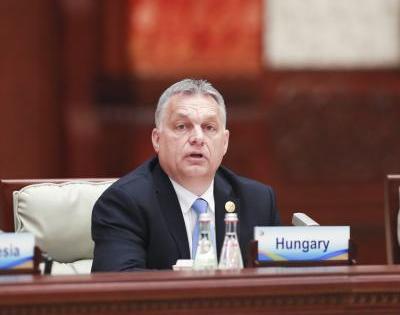Hungary's Orban receives exemption from EU oil embargo on Russia
By IANS | Updated: June 1, 2022 02:50 IST2022-06-01T02:39:03+5:302022-06-01T02:50:28+5:30
Budapest, June 1 The European Commission's proposal to ban the use of oil from Russia in Hungary was ...

Hungary's Orban receives exemption from EU oil embargo on Russia
Budapest, June 1 The European Commission's proposal to ban the use of oil from Russia in Hungary was rejected, Hungary's Prime Minister Viktor Orban said.
The Commission's proposal was "tantamount to dropping a nuclear bomb on Hungary's economy, but we successfully avoided it," Orban added on Tuesday in a video message posted on social media following an agreement by the European Union (EU) member states' leaders to impose a partial embargo on Russian oil imports.
At their special summit in Brussels, EU leaders agreed late Monday evening a sixth package of sanctions against Russia, which includes a ban on "more than two-thirds" of Russian oil imports to the bloc, Xinhua news agency reported.
In a tweet, European Council President Charles Michel called the measure the "maximum pressure" on Russia to end the conflict.
Prior to the summit, Hungary, which imports 65 per cent of its oil needs from Russia through the Druzhba (Friendship) pipeline, had asked for an exemption from the ban along with Slovakia and the Czech Republic.
"We brokered an agreement that states that those countries that receive oil through pipelines may continue managing it under the old conditions," the Hungarian Prime Minister said.
"We have enough problems already: energy prices are soaring, inflation is high, and all of Europe is teetering on the edge of a global economic crisis because of the sanctions," he added.
A sixth package of sanctions against Russia was proposed by the European Commission on May 4.
These include a complete import ban on all Russian oil, seaborne and pipeline, crude and refined.
However, the EU member states' Foreign Ministers failed to agree on the sanctions on May 16 due to Hungary's opposition.
Disclaimer: This post has been auto-published from an agency feed without any modifications to the text and has not been reviewed by an editor
Open in app